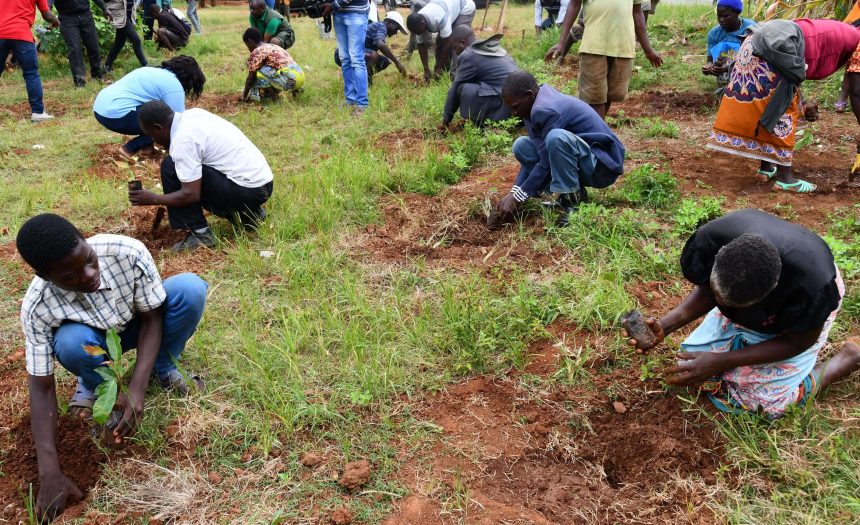MALAWI: Wongani Munthali remembers the good old days when farming was the emblem of success in northern Mzimba, Malawi.
“Life was good in farming, and I never dreamed about looking for employment. In fact, those in employment came to me looking for money,” he said.
With an ample harvest of maize, groundnuts and tobacco from his farm, he would sell the surplus for income. Munthali was a wealthy, content farmer.
“If you see these cows, goats, the ox-cart and even my house, they are from farming income,” he said.
Today, Munthali is a disillusioned man. After experiencing several losses in recent years, he sees agriculture as “a disaster.’
The first problem, he says, is the unpredictable rains.
“They come at a time they want and stop at their own time. What do you expect from our farming which relies on rain-fed agriculture?” he asked rhetorically. “What is more painful is that when the rains come, they destroy crops. A season ago, most of my crops were swept away as there were floods all over my area.”
And that is not all.
“After the floods came drought which made the remaining crops wither,” added Munthali.
Malawi has been experiencing the devastating effects of climate change. Since the severe tropical storm, Chedzwa, hit the country in January 2015, killing 104 people, the country has experienced an increase in the number of tropical cyclones.
In 2022 alone, the country experienced widespread floods caused by tropical storms: Ana, Idai and Gombe. The floods caused death, mass displacement, drowned livestock, and submerged crop fields.
Agriculture is the most critical sector in Malawi’s economy, making up 36% of its gross domestic product and nearly 70% of its foreign exchange earnings. It’s also the highest employer, with 80% of Malawians working in the sector.
The biggest foreign exchange earner is tobacco. Other major crops are tea, coffee, sugar and cotton.
Agriculture in Malawi is primarily rain-fed, making farmers vulnerable to weather variability and climate change impacts. Even the government has no magic bullet to solve this problem.
Sandram Maweru, the principal secretary in the Ministry of Agriculture, says there is nothing the country can do about climate change apart from encouraging farmers to adopt new farming methods.
“If we cannot farm, we will collapse as a country because our economy relies on agriculture. As such, if we decide to continue, climate-smart- agriculture is the only way,” he said.
Maweru adds that as much as the government emphasises the need to use irrigation farming methods, it has to be in tandem with climate-smart agriculture.
“I am talking about irrigation farming without diesel engines because they pollute the air. Everything has to be done naturally. That will help increase agricultural productivity,” he said.
Farmers Union of Malawi (FUM) president, Frighton Njolomole, says most farmers are now adopting smart agriculture, intercropping and crop rotation.
Njolomole also says farmers participate in land and catchment restoration activities, so farming is not heavily affected.
“We have also been encouraging farmers to plant trees around their gardens. This will help to reduce the impact of climate change. Luckily, they understand this considering the reduced yield they have been realising lately,” he said.
The climate change disaster has prompted the media to intervene.
The Association of Environmental Journalists was formed to promote science and environmental communication in Malawi.
Its president, Mathews Malata, says the country is making gains in the fight against climate change.
“There is massive deforestation in Malawi caused by charcoal-making and firewood, as only a few people are using electricity. There are things we have done better to fight climate change, and there are areas we need to improve. This can be achieved if we accept that climate change is real,” Malata said.
“We have seen increased interest in scaling irrigation farming in Malawi, which is good. We are also doing a lot of forest restoration, but we should not relax because there are many things to be done.”
The country has plenty of water in Lake Malawi and the Shire River. As such, Malata appreciates the Shire-Valley Transformation Programme, the country’s biggest irrigation project that will enhance agricultural output.
The country is also turning to medium-scale irrigation projects that can more easily be run by groups of farmers, while crop diversification is another critical government initiative.
Traditional leaders, like Paramount Chief M’mbelwa of Mzimba, have also risen to the challenge of ensuring that farmers adopt new farming techniques. M’mbelwa engages his community in climate-smart agriculture adaptation and monitors how farmers respond to the messaging.
“They come to me and complain about low harvest despite applying fertilisers. The problem is not the fertiliser or soil; it is climate change which they need to deal with, and it’s new agricultural practices that can minimise the effects,” he said.
Earlier in the year, the African Development Fund approved a US$20.2 million grant to support 300,000 farmers in Malawi. The farming households were provided 2,500 tons of climate-smart certified cereal, legume seeds, and 70,000 tons of fertiliser.
In October 2022, the government rolled out a World-Bank-funded matching grant of US$160 million to farmers to enhance climate-smart agricultural practices.
The IMF, in November 2022, also approved a disbursement of US$88 million to Malawi to mitigate the impact of the food shock.
Wongani Munthali hopes that with these initiatives to support farmers, he will reclaim his former glory as the “well-known, successful farmer” in Mzimba.
bird story agency





